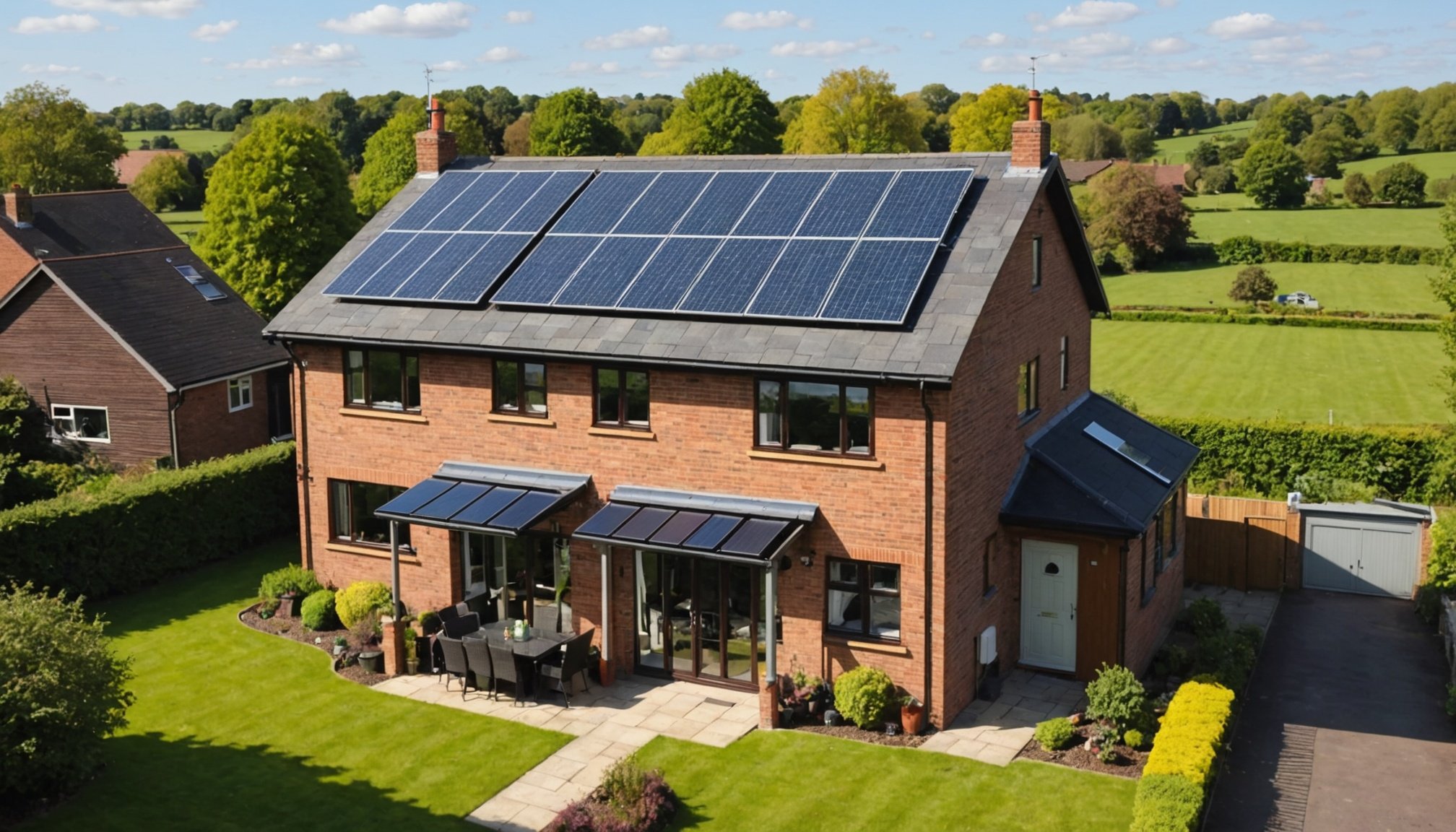Understanding Solar Panel Installations
For UK homeowners, solar panels represent a crucial investment in sustainable energy. Solar energy provides a renewable option that reduces carbon footprints and lowers electricity bills. Recognising the benefits, many are turning towards solar panel installation as a savvy long-term investment.
When it comes to types of solar panel systems, homeowners have several choices. The most common include monocrystalline, polycrystalline, and thin-film solar panels. Each type has unique features affecting efficiency and cost, making it essential to understand which best suits your needs.
Lire également : Top Soundproofing Solutions for DIY Projects in Lively UK Urban Homes
Installation costs, a pivotal factor for homeowners, depend on various elements. These may include the size and type of the panel system, location, roof condition, and installation company. Initial investment can be significant but is often offset by long-term savings.
Solar panel installation also benefits from government incentives, enhancing its attractiveness as an investment. Homeowners should explore these options to maximise financial return.
A lire en complément : Top-performing Cordless Vacuum Cleaners for Pet Owners in the UK: Find Your Perfect Match!
Engaging with experts in solar panel installation ensures that UK homeowners not only contribute positively to the environment but also make an informed and economically sound decision. Being familiar with these considerations ensures a smooth transition to solar energy, tailored to individual needs.
Profitability of Solar Panels
Investing in solar panels is a decision often driven by the potential for solar panel profitability. At the core of this is the financial return you can expect, which hinges on how well you can calculate the return on investment (ROI). Begin by considering the upfront cost, which includes purchase, installation, and maintenance expenses. Subtract potential energy savings—the reduction in electricity bills due to the energy generated by your solar panels—from these costs over a designated period, usually 20-25 years. The difference provides an indication of your ROI.
In the United Kingdom, homeowners have seen substantial benefits from solar installations. For instance, households in sunnier regions outperform others in terms of financial returns, highlighting the geographical variability in ROI. Adopters in these areas often recoup their investment faster, enhancing the overall profitability.
It’s crucial to compare financial returns across different solar technologies. Monocrystalline panels, for instance, may initially cost more but generally offer higher efficiency, resulting in greater long-term savings. Conversely, polycrystalline panels might be less expensive upfront but offer lower efficiency, affecting the overall energy savings. Evaluating these technologies can greatly influence the long-term profitability of your solar panel investment.
Government Incentives and Financing Options
With an increasing emphasis on sustainable energy, there are various UK government incentives available to encourage the installation of solar panels. These incentives make it more appealing for homeowners to consider solar energy as a viable option. The UK government offers several solar subsidies, such as the Smart Export Guarantee (SEG), which allows households to be paid for the excess energy they generate and feed back into the national grid.
For those interested in going solar but concerned about costs, various financing options can make this transition more manageable. Homeowners can explore financing alternatives like green home loans, which typically offer lower interest rates for energy-efficient home improvements. Some banks provide tailored loans specifically for solar installations, giving homeowners the flexibility to manage upfront costs over a longer period.
Navigating the application process for obtaining these solar subsidies might seem daunting, but it is quite straightforward. Begin by researching the specific incentives available in your area, then consult with an accredited solar panel installation company. They can guide you through the necessary paperwork and ensure that your application for government incentives is completed correctly. By pursuing these options, homeowners can make an informed decision that benefits both their finances and the environment.
Maximizing Energy Efficiency
When striving for energy efficiency in your home, maximizing solar optimization becomes crucial. Solar panels, while inherently eco-friendly, need regular maintenance to transform sunlight into usable energy effectively. Simple tips like cleaning the panels regularly and ensuring no shading obstruction can significantly boost energy output.
However, energy efficiency isn’t just about maintaining your solar panels. Upgrading your home with energy-efficient appliances can further enhance your savings strategies. Investing in smart thermostats, LED lighting, and high-efficiency water heaters can reduce unnecessary energy consumption. These upgrades ensure that the energy generated is not wasted but used optimally.
Implementing these energy efficiency measures alongside solar installations is not just a theoretical concept. Many homeowners have experienced significant savings by incorporating efficiency upgrades. For instance, one family in Arizona cut their energy costs by nearly 50% after upgrading their insulation and HVAC systems, coupled with solar energy use.
In summary, integrating solar optimization strategies with targeted energy efficiency improvements can lead to substantial energy and cost benefits. This holistic approach ensures that each watt generated is effectively utilized, making the combination of solar technology and efficiency measures a smart choice for sustainable living.
Long-term Savings Projections
Investing in solar panels can yield significant long-term savings, but understanding the timeline of these benefits is crucial. Typically, savings begin to accumulate shortly after installation. However, the most substantial financial gains are realised over an extended investment horizon.
Energy price fluctuations play a pivotal role in these projections. As traditional energy costs rise, the savings from solar energy become even more pronounced. This means that while initial savings might seem modest, the cumulative benefit compounds as utility bills increase over time.
Market trends further influence the long-term savings potential. Advances in technology and production efficiency can lead to lower installation costs and improved solar panel efficiency. Consequently, investing in solar panels becomes more attractive as these innovations enhance the return on investment.
Here is a breakdown of typical savings over varying timeframes:
- Short-term (1-5 years): Early savings stem primarily from reduced energy bills.
- Mid-term (5-10 years): As you’ve recouped some initial costs, savings grow more apparent.
- Long-term (10-25 years): Significant cumulative savings arise as energy independence strengthens and utility rates escalate.
Understanding these dynamics helps ensure that your solar panel investment aligns with your financial goals.
Common Myths and Misconceptions
When considering solar panels, homeowners often encounter myths and misconceptions that may hinder their investment. One widespread misunderstanding is that solar panels do not last long or require high maintenance. In reality, most panels have a lifespan of 25-30 years and require minimal upkeep. Periodic cleaning and annual check-ups are usually sufficient to ensure peak performance.
Another false belief is that solar panels only work in sunny climates. Solar technology is effective in various weather conditions, not just under the blazing sun. Even cloudy areas receive enough sunlight to make solar a viable energy source. Homeowner education is crucial in debunking these myths and clarifying that panels harness diffuse sunlight, making them functional even in less sunny locales.
Moreover, the expectation of immediate savings is a common misconception. While solar panels can significantly reduce energy bills, this effect is gradual. Homeowners can expect noticeable savings over several years rather than instantly. Thus, understanding the nuances of performance and financial benefits can lead to more informed decisions. Proper education about solar panels empowers homeowners with realistic expectations and encourages sustainable investments.











